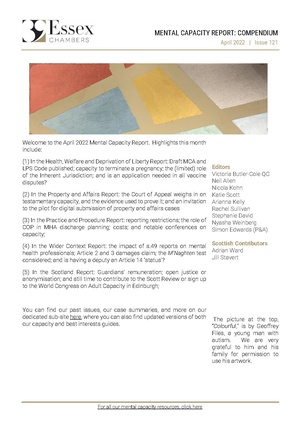Information for "R v Keal (2022) EWCA Crim 341"
Basic information
| Display title | R v Keal [2022] EWCA Crim 341 |
| Default sort key | R v Keal (2022) EWCA Crim 341 |
| Page length (in bytes) | 1,485 |
| Page ID | 14167 |
| Page content language | en - English |
| Page content model | wikitext |
| Indexing by robots | Allowed |
| Number of redirects to this page | 0 |
| Counted as a content page | Yes |
| Page image |  |
Page protection
| Edit | Allow only users with "editing" permission (infinite) |
| Move | Allow only users with "editing" permission (infinite) |
Edit history
| Page creator | Jonathan (talk | contribs) |
| Date of page creation | 20:53, 19 March 2022 |
| Latest editor | Jonathan (talk | contribs) |
| Date of latest edit | 13:02, 7 September 2022 |
| Total number of edits | 6 |
| Total number of distinct authors | 1 |
| Recent number of edits (within past 90 days) | 0 |
| Recent number of distinct authors | 0 |
Page properties
SEO properties
Description | Content |
Article description: (description)This attribute controls the content of the description and og:description elements. | (1) In order to establish the defence of insanity within the M'Naghten Rules on the ground of not knowing the act was "wrong", the defendant must establish both that (a) he did not know that his act was unlawful (i.e. contrary to law) and (b) he did not know that his act was "morally" wrong (also expressed as wrong "by the standards of ordinary people"). "Wrong" means both against the law and wrong by the standards of ordinary reasonable people. (2) Under the M'Naghten Rules, the defence of insanity is not available to a defendant who, although he knew what he was doing was wrong, believed that he had no choice but to commit the act in question. (3) The current law on insanity cannot be interpreted as involving an element of "choice", as significant changes to an aspect of our criminal law that has remained undisturbed for so long, laden with policy choices as they would be, are more properly for Parliament. (4) The judge's direction of law in the present case was appropriate and the convictions are safe. |